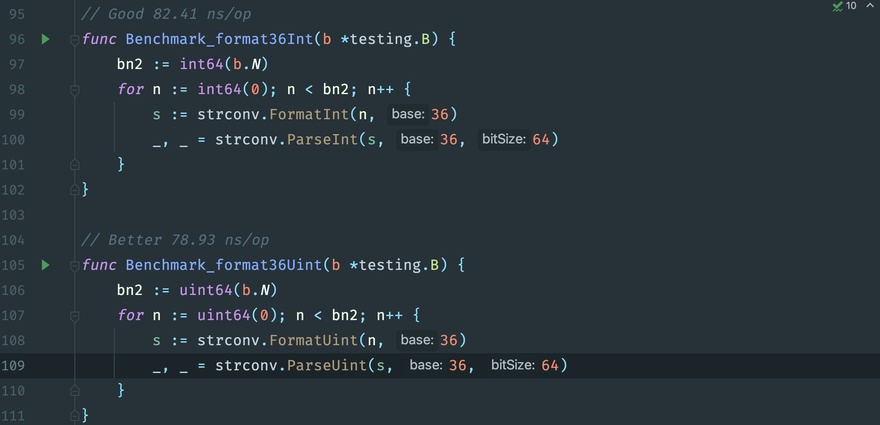使用 Go 语言实现10进制与36进制互转及性能,可以使用内置库 strconv 轻松实现。

利用 strconv 两个函数
1
2
s := strconv.FormatInt(n, 36)
_, _ = strconv.ParseInt(s, 36, 64)
如果用 Uint 则快一点点,为了更好性能,可以专门对 10 转 36 进制写一个专用库,已经有大神写好了 https://github.com/martinlindhe/base36
因为少了很多判断,直接使用既定预设的情况,速度快很多,截取里面主要部分:
1
2
3
4
5
6
7
8
9
10
11
12
13
14
15
16
17
18
19
20
21
22
23
24
25
26
27
28
29
30
31
32
33
34
35
36
37
38
39
40
41
42
43
44
45
46
47
48
49
50
51
52
53
54
55
56
57
58
59
60
61
62
63
64
65
66
67
68
69
70
71
72
var (
base36 = []byte{
'0', '1', '2', '3', '4', '5', '6', '7', '8', '9',
'A', 'B', 'C', 'D', 'E', 'F', 'G', 'H', 'I', 'J',
'K', 'L', 'M', 'N', 'O', 'P', 'Q', 'R', 'S', 'T',
'U', 'V', 'W', 'X', 'Y', 'Z'}
uint8Index = []uint64{
0,
0, 0, 0, 0, 0, 0, 0, 0, 0, 0,
0, 0, 0, 0, 0, 0, 0, 0, 0, 0,
0, 0, 0, 0, 0, 0, 0, 0, 0, 0,
0, 0, 0, 0, 0, 0, 0, 0, 0, 0,
0, 0, 0, 0, 0, 0, 0, 0, 1, 2,
3, 4, 5, 6, 7, 8, 9, 0, 0, 0,
0, 0, 0, 0, 10, 11, 12, 13, 14,
15, 16, 17, 18, 19, 20, 21, 22, 23, 24,
25, 26, 27, 28, 29, 30, 31, 32, 33, 34,
35, 0, 0, 0, 0, 0, 0, 10, 11, 12, 13,
14, 15, 16, 17, 18, 19, 20, 21, 22, 23,
24, 25, 26, 27, 28, 29, 30, 31, 32, 33,
34, 35, 0, 0, 0, 0, 0, 0, 0, 0,
0, 0, 0, 0, 0, 0, 0, 0, 0, 0,
0, 0, 0, 0, 0, 0, 0, 0, 0, 0,
0, 0, 0, 0, 0, 0, 0, 0, 0, 0,
0, 0, 0, 0, 0, 0, 0, 0, 0, 0,
0, 0, 0, 0, 0, 0, 0, 0, 0, 0,
0, 0, 0, 0, 0, 0, 0, 0, 0, 0,
0, 0, 0, 0, 0, 0, 0, 0, 0, 0,
0, 0, 0, 0, 0, 0, 0, 0, 0, 0,
0, 0, 0, 0, 0, 0, 0, 0, 0, 0,
0, 0, 0, 0, 0, 0, 0, 0, 0, 0,
0, 0, 0, 0, 0, 0, 0, 0, 0, 0,
0, 0, 0, 0, 0, 0, 0, 0, 0, 0,
0, 0, 0, 0, 0, // 256
}
pow36Index = []uint64{
1, 36, 1296, 46656, 1679616, 60466176,
2176782336, 78364164096, 2821109907456,
101559956668416, 3656158440062976,
131621703842267136, 4738381338321616896,
9223372036854775808,
}
)
// Bs36Encode encodes a number to base36.
func Bs36Encode(value uint64) string {
var res [16]byte
var i int
for i = len(res) - 1; ; i-- {
res[i] = base36[value%36]
value /= 36
if value == 0 {
break
}
}
return string(res[i:])
}
// Bs36Decode decodes a base36-encoded string.
func Bs36Decode(s string) uint64 {
if len(s) > 13 {
s = s[:12]
}
res := uint64(0)
l := len(s) - 1
for idx := 0; idx < len(s); idx++ {
c := s[l-idx]
res += uint8Index[c] * pow36Index[idx]
}
return res
}
性能比较
比较代码
1
2
3
4
5
6
7
8
9
10
11
12
13
14
15
16
17
18
19
20
21
22
23
24
25
26
// Good 82.41 ns/op
func Benchmark_format36Int(b *testing.B) {
bn2 := int64(b.N)
for n := int64(0); n < bn2; n++ {
s := strconv.FormatInt(n, 36)
_, _ = strconv.ParseInt(s, 36, 64)
}
}
// Better 78.93 ns/op
func Benchmark_format36Uint(b *testing.B) {
bn2 := uint64(b.N)
for n := uint64(0); n < bn2; n++ {
s := strconv.FormatUint(n, 36)
_, _ = strconv.ParseUint(s, 36, 64)
}
}
// Best 19.97 ns/op
func Benchmark_formatBs36Uint(b *testing.B) {
bn2 := uint64(b.N)
for n := uint64(0); n < bn2; n++ {
s := Bs36Encode(n)
_ = Bs36Decode(s)
}
}
比较结果
1
2
3
4
5
6
Benchmark_format36Int
Benchmark_format36Int-8 16581802 82.41 ns/op 5 B/op 0 allocs/op
Benchmark_format36Uint
Benchmark_format36Uint-8 17468564 78.93 ns/op 5 B/op 0 allocs/op
Benchmark_formatBs36Uint
Benchmark_formatBs36Uint-8 73328091 19.97 ns/op 0 B/op 0 allocs/op
可以看到,这个特定功能的库速度很快!这个库也考虑了大小写
1
2
3
4
5
6
7
8
func main() {
n := uint64(time.Now().Unix())
s := Bs36Encode(n)
n2 := Bs36Decode(s)
fmt.Println(n, s, n2)
fmt.Println(Bs36Decode("KSX180"))
fmt.Println(Bs36Decode("Ksx180"))
}
结果:
1
2
3
1257894000 KSX180 1257894000
1257894000
1257894000
本文网址: https://golangnote.com/topic/315.html 转摘请注明来源